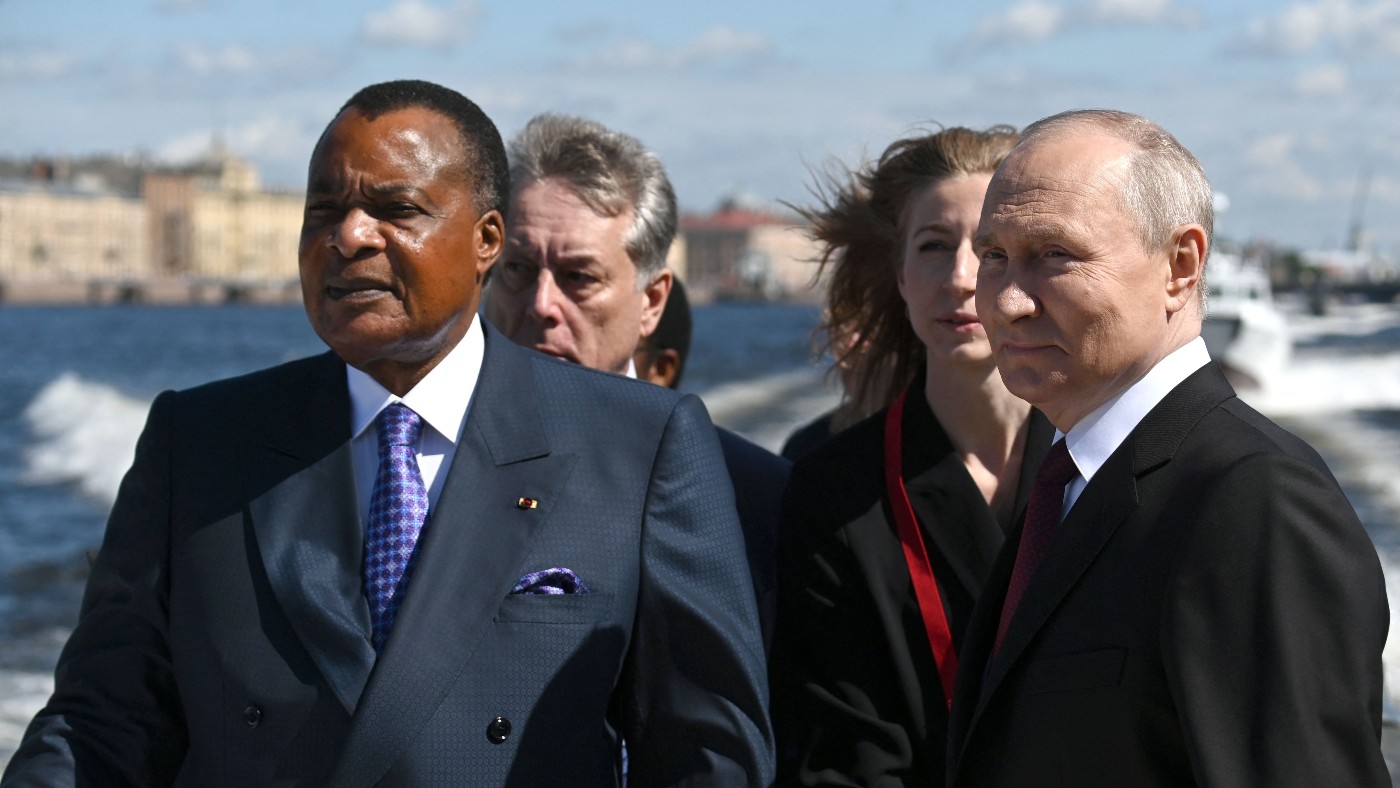Why Putin is weaponising grain in the war with Ukraine
Russian president’s use of food as a strategic weapon could prove brutally effective

A free daily email with the biggest news stories of the day – and the best features from TheWeek.com
You are now subscribed
Your newsletter sign-up was successful
The cynicism of Vladimir Putin knows no bounds, said The Sunday Times. Having abandoned the UN-brokered grain deal that ensured safe passage for Ukraine’s crops to markets, despite warnings that it could cause “hunger or worse” in low-income African nations, the Russian president last week had the nerve to pose as a loyal friend of the continent at the Russia-Africa Summit in St Petersburg.
He promised to supply free Russian grain to six African countries, including Eritrea and Somalia. He talked of wiping out debt and quoted Nelson Mandela. It emerged that he had given a helicopter to Zimbabwe’s president. Africa should beware of Putin’s blandishments, said Tafi Mhaka on Al Jazeera. When 43 African heads of state attended the first of these summits nearly four years ago (only 17 attended last week’s meeting), the “nature and scale of Russia’s imperial aggression” wasn’t yet clear. It is now. “Africa needs progressive, law-abiding and dependable partners. It doesn’t need a friend like Russia.”
‘Cynical but effective’
Cynical it may be, but Putin’s use of grain as a strategic weapon could prove brutally effective, said Simon Johnson and Oleg Ustenko in the Los Angeles Times. It threatens to bring about a global food crisis and a surge in disaster-driven migration that will heap pressure on the West. In 2021-22, Ukraine exported between three and six million metric tonnes of grain a month, mostly by ship through the Black Sea. This route is now blocked. Last month, Russian forces destroyed a grain terminal in the port of Odesa, “wiping out storage facilities holding enough grain to feed nearly 300,000 people for a year”.
The Week
Escape your echo chamber. Get the facts behind the news, plus analysis from multiple perspectives.

Sign up for The Week's Free Newsletters
From our morning news briefing to a weekly Good News Newsletter, get the best of The Week delivered directly to your inbox.
From our morning news briefing to a weekly Good News Newsletter, get the best of The Week delivered directly to your inbox.
Ukrainian farmers can still export some grain by road, rail and barge, said The Economist. But this is slower and more expensive, and Russia has started attacking these alternative routes. It’s taking a huge toll on the economy of Ukraine, which relies on food exports. If farmers can’t earn enough, they won’t be able to replant their fields, ruining the next harvest.
‘Giving in to Moscow could exacerbate the problem’
Russia’s blockage of Ukraine’s food exports could spell “disaster for millions” in the developing world, said Simon Jenkins in The Guardian. On humanitarian grounds, we must do all we can to avoid that, even if it means negotiating with Putin and lifting some of our “ineffective” sanctions on Russia’s economy. But giving in to Moscow’s demands will only encourage it to make further use of this pressure point, said Yevgeniya Gaber in The Washington Post. Better to address “the root cause of the problem: Russia’s control of maritime routes”.
If Nato won’t send ships to escort grain vessels through the Back Sea, it must at least provide Ukraine with the means – anti-ship and anti-submarine weapons, jets, long-range missiles – to defend its sea lanes. “Ukraine’s grain is vital for keeping the world fed, and Russia simply cannot be allowed to have a veto on whether it gets to market.”
A free daily email with the biggest news stories of the day – and the best features from TheWeek.com
-
 Health insurance: Premiums soar as ACA subsidies end
Health insurance: Premiums soar as ACA subsidies endFeature 1.4 million people have dropped coverage
-
 Anthropic: AI triggers the ‘SaaSpocalypse’
Anthropic: AI triggers the ‘SaaSpocalypse’Feature A grim reaper for software services?
-
 NIH director Bhattacharya tapped as acting CDC head
NIH director Bhattacharya tapped as acting CDC headSpeed Read Jay Bhattacharya, a critic of the CDC’s Covid-19 response, will now lead the Centers for Disease Control and Prevention
-
 New START: the final US-Russia nuclear treaty about to expire
New START: the final US-Russia nuclear treaty about to expireThe Explainer The last agreement between Washington and Moscow expires within weeks
-
 What would a UK deployment to Ukraine look like?
What would a UK deployment to Ukraine look like?Today's Big Question Security agreement commits British and French forces in event of ceasefire
-
 Would Europe defend Greenland from US aggression?
Would Europe defend Greenland from US aggression?Today’s Big Question ‘Mildness’ of EU pushback against Trump provocation ‘illustrates the bind Europe finds itself in’
-
 Is conscription the answer to Europe’s security woes?
Is conscription the answer to Europe’s security woes?Today's Big Question How best to boost troop numbers to deal with Russian threat is ‘prompting fierce and soul-searching debates’
-
 Trump peace deal: an offer Zelenskyy can’t refuse?
Trump peace deal: an offer Zelenskyy can’t refuse?Today’s Big Question ‘Unpalatable’ US plan may strengthen embattled Ukrainian president at home
-
 Vladimir Putin’s ‘nuclear tsunami’ missile
Vladimir Putin’s ‘nuclear tsunami’ missileThe Explainer Russian president has boasted that there is no way to intercept the new weapon
-
 The Baltic ‘bog belt’ plan to protect Europe from Russia
The Baltic ‘bog belt’ plan to protect Europe from RussiaUnder the Radar Reviving lost wetland on Nato’s eastern flank would fuse ‘two European priorities that increasingly compete for attention and funding: defence and climate’
-
 How should Nato respond to Putin’s incursions?
How should Nato respond to Putin’s incursions?Today’s big question Russia has breached Nato airspace regularly this month, and nations are primed to respond